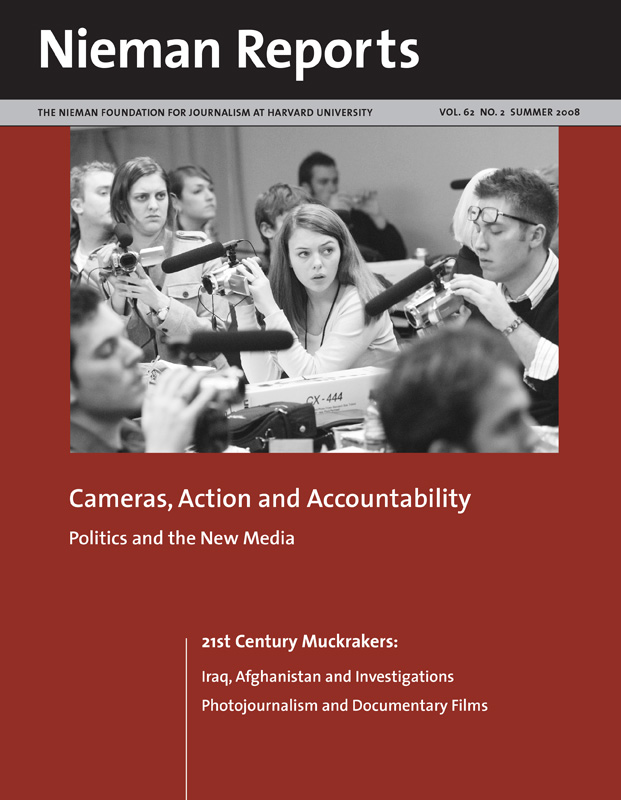The rise of blogging as both a supplement and a challenge to traditional journalism has coincided with an explosion of opinion mongering. Blogs — and the role they play in how Americans consume and respond to information — are increasingly visible during our political season, when our ideological divide is most apparent. From nakedly partisan sites such as Daily Kos on the left and Little Green Footballs on the right, to more nuanced but nevertheless ideological enterprises such as Talking Points Memo, it sometimes seems there is no room in blogworld for straight, neutral journalism.
The usual reasons given for this are that reporting is difficult and expensive and that few bloggers know how to research a story, develop and interview sources, and assemble the pieces into a coherent, factual narrative. Far easier, so this line of thinking goes, for bloggers to sit in their pajamas and blast their semi-informed opinions out to the world.
There is some truth to this, although embracing this view wholeheartedly requires us to overlook the many journalists who are now writing blogs, as well as the many bloggers who are producing journalism to a greater or lesser degree. But we make a mistake when we look at the opinion-oriented nature of blogs and ask whether bloggers are capable of being "objective," to use a hoary and now all but meaningless word. The better question to ask is why opinion-oriented blogs are so popular — and what lessons the traditional media can learn from them without giving up their journalistic souls.
Perhaps what's happening is that the best and more popular blogs provide a sense of community that used to be the lifeblood of traditional news organizations and, especially, of newspapers. Recently I reread part of Jay Rosen's book, "What Are Journalists For?," his 1999 postmortem on the public journalism movement. What struck me was Rosen's description of public journalism's origins, which were grounded in an attempt to recreate a sense of community so that people might discover a reason to read newspapers. "Eventually I came to the conclusion … that journalism's purpose was to see the public into fuller existence," Rosen writes. "Informing people followed that."
Rosen's thesis — that journalism could only be revived by reawakening the civic impulse — is paralleled by Robert Putnam's 2000 book, "Bowling Alone," in which he found that people who sign petitions, attend public meetings, and participate in religious and social organizations are more likely to be newspaper readers than those who do not. "Newspaper readers are older, more educated, and more rooted in their communities than is the average American," Putnam writes.
Unfortunately for the newspaper business, the traditional idea of community, based mainly on geography, remains as moribund today as it was when Rosen and Putnam were analyzing its pathologies. But if old-fashioned communities are on the decline, the human impulse to form communities is not. And the Internet, as it turns out, is an ideal medium for fostering a new type of community in which people have never met, and may not even know each other's real names, but who share certain views and opinions about the way the world works. It's interesting that Rosen has become a leading exponent of journalism tied to these communities, both through his PressThink blog and through NewAssignment.net, which fosters collaborations between professional and citizen journalists.
Attitude First, Facts Second
This trend toward online community-building has given us a mediascape in which many people — especially those most interested in politics and public affairs — want the news delivered to them in the context of their attitudes and beliefs. That doesn't mean they want to be fed a diet of self-reinforcing agit-prop (although some do). It does mean they see their news consumption as something that takes place within their community, to be fit into a pre-existing framework of ideas that may be challenged but that must be acknowledged.
Earlier this year John Lloyd, a contributing editor for the Financial Times, talked about the decline of just-the-facts journalism on "Open Source," a Web-based radio program hosted by the veteran journalist Christopher Lydon. It has become increasingly difficult, Lloyd said, to report facts that are not tied to an ideological point of view. The emerging paradigm, he explained, may be "that you can only get facts through by attaching them to a very strong left-wing, right-wing, Christian, atheist position. Only then, only if you establish your bona fides within this particular community, will they be open to facts."
No less a blogging enthusiast than Markos Moulitsas, founder of Daily Kos, has observed that political blogs are a nonentity in Britain, where the newspapers themselves cater to a wide range of different opinions. "You look at the media in Britain, it's vibrant and it's exciting and it's fun, because they're all ideologically tinged," Moulitsas said at an appearance in Boston last fall. "And that's a good thing, because people buy them and understand that their viewpoints are going to be represented."
The notion that journalism must be tied to an ideological community may seem disheartening to traditionalists. In practice, though, journalism based on communities of shared interests and beliefs can be every bit as valuable as the old model of objectivity, if approached with rigor and respect for the truth.
Last year, for instance, Talking Points Memo (TPM) and its related blogs helped break the story of how the U.S. Department of Justice had fired eight U.S. attorneys for what appeared to be politically motivated reasons, a scandal that led to the resignation of Attorney General Alberto Gonzales. TPM's reporting was based in part on information dug up and passed along by its liberal readership. The founder and editor, Joshua Micah Marshall, received a George Polk Award, but it belonged as much to the community he had assembled as it did to him personally.
Of course, we still need neutral, non-opinionated journalism to help us make sense of the world around us. TPM's coverage of the U.S. attorneys scandal was outstanding, but it was also dismissive of arguments that it was much ado about nothing, or that previous administrations had done the same or worse. Liberals or conservatives who get all of their news from ideologically friendly sources don't have much incentive to change their minds.
Connecting to Communities of Shared Interests
Even news outlets that excel at traditional, "objective" journalism do so within the context of a community. Some might not find liberal bias in the news pages of The New York Times, as the paper's conservative critics would contend, but there's little doubt that the Times serves a community of well educated, affluent, culturally liberal readers whose preferences and tastes must be taken into account. Not to be a journalistic relativist, but all news needs to be evaluated within the context in which it was produced, even an old-fashioned, inverted-pyramid-style dispatch from the wires. Who was interviewed? Who wasn't? Why? These are questions that must be asked regardless of the source.
We might now be coming full circle as placeblogs — chatty, conversational blogs that serve a particular geographic community — become more prevalent. Lisa Williams, founder of H2otown, a blog that serves her community of Watertown, Massachusetts, believes that such forums could help foster the sense of community that is a necessary precondition to newspaper readership. Williams also runs a project called Placeblogger.com, which tracks local blogs around the world.
"The news creates a shared pool of stories that gives us a way to talk to people who aren't family or close friends or people who we will never meet — in short, our fellow citizens," Williams says by e-mail. "The truth is, people still want those neighbor-to-neighbor contacts, but the traditional ways of doing it don't fit into the lives that people are actually living today. Your core audience is tired, sitting on the couch with their laptop, and watching 'Lost' with one eye. Give them someone to sit with."
Critics of blogs have been looking at the wrong thing. While traditionalists disparage bloggers for their indulgence of opinion and hyperbole, they overlook the sense of community and conversation that blogs have fostered around the news. What bloggers do well, and what news organizations do poorly or not at all, is give their readers someone to sit with. News consumers — the public, citizens, us — still want the truth. But we also want to share it and talk about it with our like-minded neighbors and friends. The challenge for journalism is not that we'll lose our objectivity; it's that we won't find a way to rebuild a sense of community.
Dan Kennedy, an assistant professor of journalism at Northeastern University, writes on media issues for The Guardian and for CommonWealth Magazine. His blog, Media Nation, is online at medianation.blogspot.com.



